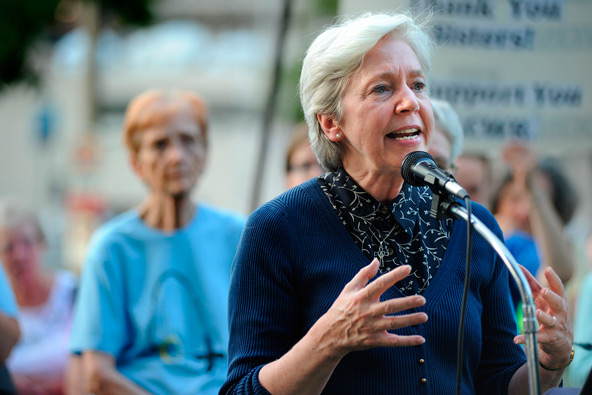
WASHINGTON (CNS) — The way 900 women religious “went about the decision” of responding to the Vatican's doctrinal assessment of their organization was almost as “historic and important as the decision itself,” said Dominican Sister Mary Hughes, a former president of the Leadership Conference of Women Religious.
Sister Hughes, addressing an Aug. 16 luncheon at the National Press Club in Washington, said that although the sisters devoted a significant amount of time to the assessment during their Aug. 7-10 meeting in St. Louis, they did not have “fiery speeches” or discourse but instead primarily engaged in contemplative silence, listening and prayer.
At the close of the four-day assembly, LCWR leaders, speaking on behalf of the entire group, said they would pursue “open and honest dialogue” with Church officials about the assessment by the Vatican's Congregation for the Doctrine of the Faith. The assessment, issued April 18, said a reform of LCWR was needed to ensure its fidelity to Catholic teaching in areas including abortion, euthanasia, women's ordination and homosexuality.
Seattle Archbishop J. Peter Sartain, charged with overseeing the group's reform, met with LCWR's national board Aug. 11. He said in a statement after the meeting that he is “truly hopeful that we will work together without compromising Church teaching or the important role of the LCWR.”
The sisters' decision to seek dialogue could be their “gift to the Church,” said Sister Hughes, stressing the importance of listening to one another, which she said is so often missing in today's polarized society.
She described the dialogue's first session with Archbishop Sartain as “an honest exchange.”
When asked how the sisters would proceed if the dialogue fails, Sister Hughes said that was “too premature to answer” and she also emphasized that she was “hopeful the dialogue would continue.”
She said the sisters did not want to withdraw from the leadership organization and only the Vatican could decide if the group would lose its canonical status since it was established by the Vatican.
She stressed that women religious derive their “strength from the sacramental life of the Church” and feel their charisms are “necessary to the Church.”
When asked about speakers at LCWR meetings, something that was mentioned in the assessment, she said the organization “does not seek to have on its rosters speakers that would speak against the Church.” She also noted that the speakers at the annual meeting don't usually focus on Church doctrine since most of the leaders of women's congregations already study this.
“This would be repetitive,” she said, pointing out that the purpose of the annual meetings is to “provide leadership skills.”
When asked about the assessment's reference to LCWR's lack of emphasis on Church teaching about homosexuality or abortion, Sister Hughes said the sisters support church teaching but do so in different ways.
“We're not the same as the bishops, who do this very well,” she said.
Sister Hughes said the women religious are often counseling young women to find alternatives to abortion and many sisters also participate in the annual March for Life in Washington. She said they don't speak out on abortion or same-sex marriage as publicly as the bishops who are the teaching arm of the Church.
Although Sister Hughes said she felt “humiliated” by the assessment, she also has seen blessings associated with it.
She and the other sisters were overwhelmed by the support of Catholics. She has also appreciated that “the level of conversation” about sisters has changed from caricature “nun jokes” to “greater attention of who we are and the work that we do.”





